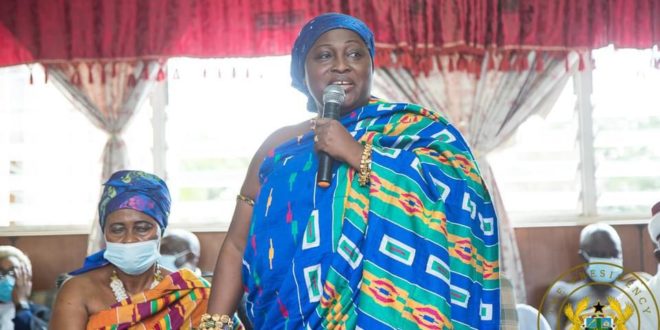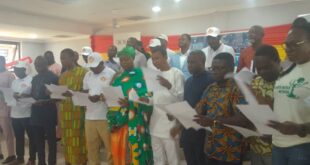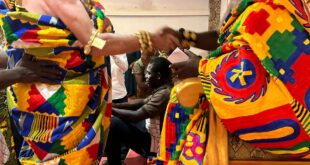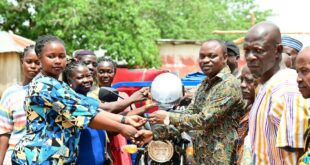The Ministry of Information, the Ghana Health Service, and Partners have provided one-day training for the Brong Ahafo Regional House of Chiefs.
This training was under the auspices of His Royal Majesty Nana Pimampim Yaw Kagbrese V, the President of Brong Ahafo Regional House of Chiefs. In his opening remarks, Nana Pimampim Yaw Kagbrese V on behalf of his chiefs thanked President Nana Addo Dankwa Akuffo Addo for the effective measures put in place by his government to slow down the spread of COVID-19 in the nation.
The Municipal Chief Executive (M.C.E) for Sunyani, Hon. Justina Owusu Banahene who represented the Regional Minister emphasized that COVID-19 is a dangerous disease that has brought to light the need for collaboration between the central and local government, chiefs, and all institutions in the fight against diseases.
Miss Mamle Andrews the Chief Director for the Ministry of Information who led the Ministry’s team revealed that the current COVID-19 education strategy by the government is low-level Community Engagement and Risk Communication and also reiterated the need to continue adhering to the safety protocols since there is no cure.
The workshop which was led by the Director Health Promotion Division of Ghana health service and Leader of National Risk Communication and Social Mobilization Committee for Ghana’s COVID-19 Response Team Dr. Da costa Aboagye focused on education on COVID-19 safety protocols, and, Non-communicable Diseases (NCDs).
Dr. Aboagye said, “The current COVID-19 pandemic has provoked social stigma and discriminatory behaviours against people of certain ethnic backgrounds as well as infected people and their families and the impact are that it drives people to hide the illness, prevent them from seeking health care immediately, and also affects their mental health.”
Dr. Da Costa said the Ministry of Health, Ghana Health Service, and the government has promised to initiate ‘wellness clinics’ as one of the key methods for early detection of NCDs with the aim of institutionalising ‘prevention is better than cure’ approach to support curative healthcare delivery.
In an exclusive interview, Dr. Da Costa said this programme will provide a platform for every Ghanaian to check their health status at least once a year. This data will be linked to the National Health Insurance data and will help reduce the high disease burden of NCDs and the cost of NHIS.
Dr. Da Costa opined that “Majority of the COVID-19 deaths that we have recorded in this country came from co-morbidities, such as Hypertension, Stroke, Diabetes, Cancers, etc. So certainly, there is the need to step up education on these Non-Communicable Diseases.”
The Leader for Risk Communication and Social Mobilization for COVID-19 however, requested the media to help health professionals propagate information on Non-Communicable Diseases (NCDs) and the importance of maintaining healthy lifestyles.
“The issue is that behaviour change is a process so we have to continuously talk about them before it effects change in people.
The media should therefore help educate and encourage Ghanaians to adopt healthy behaviours such as regular exercising, eating our local foods as well as more fruits and vegetables, having enough rest, and avoiding stress” he urged.
In his concluding remarks, Dr. Da costa urged the chiefs and opinion leaders to provide leadership towards the fight against stigma and assist individuals who have been abandoned because they contracted the virus and also intervene in situations where tenant are being ejected because they contracted the virus.
Source: Thepressradio.com/John Awuni
 Home Of Ghana News Ghana News, Entertainment And More
Home Of Ghana News Ghana News, Entertainment And More





